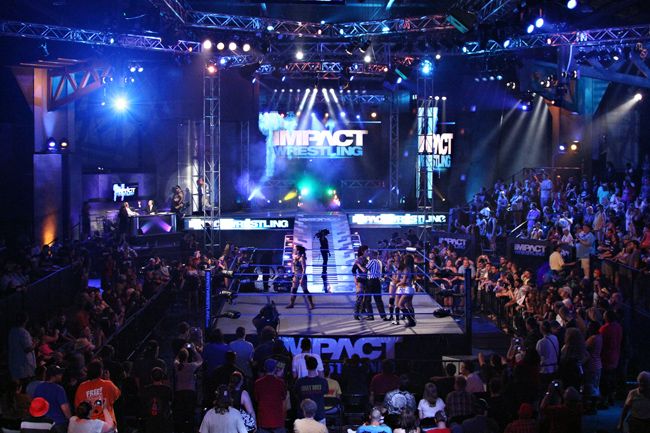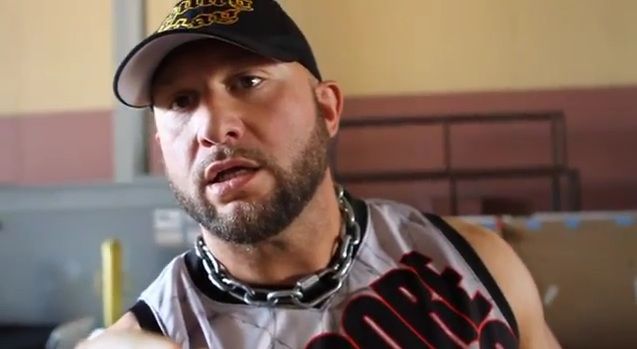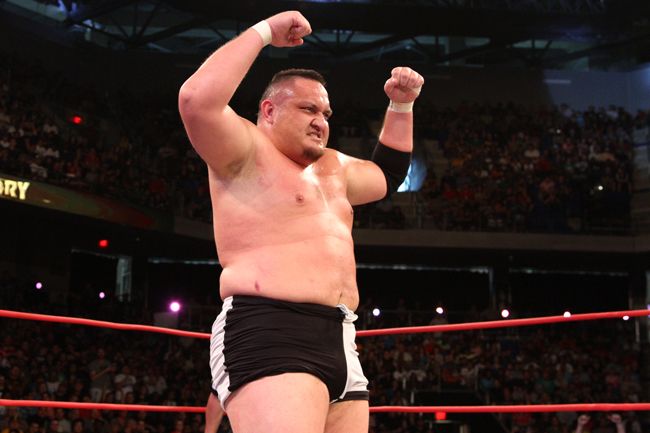wrestling / Columns
The Tale of the Table: Bully Ray, Dixie, and Domestic Violence (SPOILERS)
According to the National Coalition Against Domestic Violence, one-quarter of all women in the United States will experience some form of domestic violence in their lifetimes, with approximately 1.3 million women being physically attacked by a boyfriend, spouse, or domestic partner every year. Young women aged twenty to twenty-four are the most frequent victims of such abuse. One in six women has been the target of either an attempted or completed rape. The organization further reports that expenditures of $4.1 billion dollars are made annually as a result of medical and mental health services provided to women who have been victims of abuse perpetuated by their partners.
At this point, many of you are probably wondering why you’re reading these statistics on 411wrestling.com of all places, a website where you’re accustomed to manchild-esque topics such as “Top 7 Guardians of the Galaxy We Want to See in the Sequel” and “Selena Gomez Photographed Walking to Supermarket in Dayglo Hot Pants.”
The reason is that, for the Thursday, August 7 edition of TNA Impact on SpikeTV, the promotion has decided to run an angle that involves real life company owner Dixie Carter being powerbombed through a table by “Bully Ray,” the ECW alumnus who we all better know as Bubba Ray Dudley.

At the time I am writing this piece, the angle has not yet aired on Spike. However, it was taped in New York City weeks ago, and unofficial video of the entire segment was leaked online almost immediately after it was recorded. I saw that video and, quite frankly, was disgusted.
People who have followed this site for a while will probably recall that I have a bit of a history with Total Nonstop Action, also known as Impact Wrestling. For a period of time concluding in 2008, I wrote “The Impact Crater,” a weekly review of the wrestling promotion’s flagship television program. To put it lightly, over the course of the weeks and months that I watched the show, I grew to dislike it a great deal. Ultimately, I swore off the show and haven’t watched it since, with the exception of a handful of episodes during their failed “New Monday Night War” experiment in 2010 and on one or two occasions to help out other staff on this site when a recap needed to be covered.
I bring up my past stint covering TNA for this site mainly because I want to make it clear that what I am getting ready to say throughout the remainder of this column has nothing to do with my past coverage of the promotion. Yes, I disliked the product at the time, and many have accused me of having a bias against TNA or “being a hater” to use more contemporary parlance. However, my point today is unrelated to the quality of the company’s wrestling product because, frankly, I have no idea what that is. For all I know, TNA in 2014 is consistently putting on awesome shows with elite level talent. They could also be the saddest mockery of a wrestling promotion to disgrace national television. Which of those are they? I can’t make that assessment, because I’m not watching the product
I’m not here to write about the quality of a professional wrestling television show. I’m here to write about conduct that is socially and morally irresponsible, separate and apart from the company that is broadcasting it.

For those of you who may not be familiar with the scene being aired on Thursday, let me lay it out for you. Apparently, Dixie Carter has, for the last several months, been the top heel character on Impact, essentially playing that promotion’s version of WWE’s popular Authority characters. She has harassed many top stars of the promotion, with the idea being that she has gone so far as to “run off” several of them through her (storyline) incompetent management of the company, with her victims including Hulk Hogan and AJ Styles. Most recently, one of her favorite targets has been Bubba Ray Dudley.
In turn, this lead to Bubba making weeks’ worth of threats that he would, eventually, be putting Dixie Carter through a table. He has made repeated failed attempts, which usually concluded with one of Dixie’s flunkies, notably her nephew Ethan, taking the bump for her.
Thursday is the payoff to the angle. Bubba, along with his storyline brother and long-time tag team partner D-Von Dudley, isolate Ms. Carter from her usual band of protectors. At that point, the entire babyface locker room – men and women alike – surround the distinctive six-sided ring, presumably to guard against any possibility that this nearly fifty year old woman, who has already been incapacitated, may escape. Familiar faces like Bobby Roode, Mike Knox, and Gail Kim are all present, with two wrestlers in particular – Samoa Joe and Austin Aries – clearly whipping out their own personal iPhones to photograph or tape what is to unfold in the ring.
At that point Carter – who for reasons unknown was already laid out on the ring’s canvas – is lifted up by D-Von Dudley. As the assembled wrestlers and fans cheer him on, he first plants a big ole’ kiss on the defenseless woman’s lips, and, to the extent that she can, she recoils. At that point, Carter is lifted up and placed groin-first into the waiting arms of Bubba Ray Dudley, already perched on the second rope of the ring. Bubba holds her momentarily and the launches himself forward and downward, simulating putting Carter through the table. In reality, Dudley’s buttocks and thighs absorb most of the impact (no pun intended), but every fan and wrestler watching knows what the maneuver is meant to simulate.

They obviously know, because, the second the furniture is destroyed, the entire arena erupts into chants of “TNA! TNA!,” with the wrestlers at ringside egging them on and Eric Young at one point becoming so excited that he cannot contain himself and leaps on and off the apron. Frankly, by the reaction of everybody on camera, you would think that we just saw that “greatest moment in the history of our sport” that Tony Schiavone was always talking about fifteen years ago.
I couldn’t join them in their rejoicing. My stomach was too busy turning.
As should be clear from the statistics that I cited at the outset of this article, we are living in a nation with a domestic violence problem and a rape problem. Unfortunately, through booking this angle TNA made a decision that perpetuates that culture in which – though not explicitly encouraged – acts of violence against women are not condemned nearly as harshly as they should be.
I can already see the counterarguments being formulated by some of you. You will be quick to point out that Dixie Carter had been a pro wrestling heel for many months and that, in wrestling, heels are supposed to get their physical comeuppance at some point, without exception. You will probably also mention that, had a man been booked in the exact same position as Dixie Carter, then I would not be writing this article, as though I myself am somehow committing an act of gender discrimination. Some others might note that other television programs and movies portray violence against women on a fairly regular basis and that they do not get the same flack for it that I am giving to a wrestling show.
Unfortunately, all of those arguments ignore one little word that makes all of the difference: Context. In most of that other media that depicts violence against women, the perpetrators are shown to be the bad guys. In wrestling terms, they’re the heels, and usually they get what’s coming to them at the end of the “angle.” That’s not what we’re seeing here, though. We’re seeing acts of violence and simulated rape being used as tactics by the “good guys,” the ones who we’re supposed to cheer and who, in fact, the entire roster is gathered around the ring to cheer.
What is the message being sent by the babyface Dudley Boys being attacked by Dixie Carter? The message is clear. If you are man and there is a woman in your life who makes things difficult for you, a woman who you perceive as treating you as badly or unfairly, there are circumstances under which it is appropriate for you to not only physically assault her but also – perhaps even more problematically – force yourself upon her. Not only is it appropriate for you to do these things, but others in your life will cheer you on if you do. Your coworkers might even make a big event out of it and Instagram videos of the whole ordeal in support of you.

Obviously, rational human beings know that is wrong, and rational human beings will not emulate that behavior. It’s not rational human beings who I’m concerned about, though. It’s the irrational ones. The irrational ones who will take this message, internalize it, and, when they feel that they’ve been wronged by their wife or girlfriend or whoever else, lash out. They’ll lash out because they’ve been told that it’s OK to do so.
I’m also not trying to say that somebody who otherwise would not have done this is going to watch this one segment of TNA Impact and suddenly decide that attacking their wife is no big deal. What I’m saying is that this adds to a culture in which this behavior – again, as supported by the statistics above – is disturbingly common, and positive depictions of man-on-woman violence in the media only help to normalize that which should not be as far from normal as possible.
TNA isn’t the only media outlet that has made this mistake, and they won’t be the last. However, that doesn’t excuse them. That doesn’t mean that they didn’t have a choice. That doesn’t mean that it wouldn’t have been more responsible for them to have never booked this angle. That doesn’t mean that they’re not adding to the problem in a culture where people will defend the NFL for giving Ray Rice a slap on the wrist after knocking out his girlfriend and a culture in which some others will defend alleged UC Santa Barbara shooter for going on bizarre YouTube rants in which he talks about women as though they owe him their bodies.
TNA isn’t the only problem here. However, back on June 26 when this angle was filmed, they had a choice. They could choose to contribute to the problem or they could choose to not do so. They chose the former, and it is sad.
I do not know Dixie Carter personally. I do not know anybody else who participated in that angle as a performer, a writer, or a crew member personally. As such, I am not going to pretend that I know what their motivations or justifications are for participating. However, I hope that they reflect on it. I hope that they realize that – though it was almost certainly not intentional – they’ve sent a very dangerous and very irresponsible message about the relationships between men and women and what is acceptable in those relationships.
I also hope that, after that reflection, they make another choice – a choice to do something to effectuate a positive change in the unfortunate culture of violence against women.
More Trending Stories
- Note On Possible WWE Storyline & Faction For The Creed Brothers (POSSIBLE SPOILERS)
- Tony Khan Weighs In On Warning From Oklahoma Athletic Commission Over Nyla Rose Match
- Backstage Update on WWE’s Plans for WrestleMania 41, Possible Move to March or May
- Jim Ross Recalls Dustin Rhodes Being Fired From WCW For Not Following No-Blood Policy







